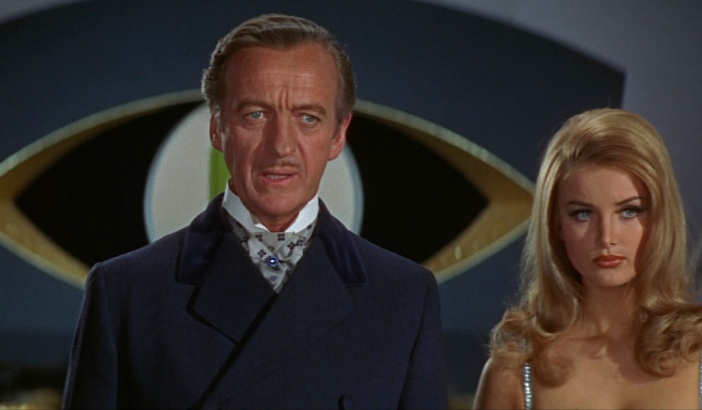If you’re passionate about the upkeep of my film criticism, consider making a donation via the following PayPal link, which will be greatly appreciated! Link: https://www.paypal.com/donate/?cmd=_donations&business=mbruce007%40outlook.com&item_name=If+you%E2%80%99re+enjoying+my+film+criticism%2C+a+donation+of+your+choice+would+be+greatly+appreciated%21+¤cy_code=GBP&source=url&Z3JncnB0=
As a fan of pure Bond, that is to say the “official” Bond film series under the direction of the Broccoli family, this is a film I usually would mention in hushed tones. Casino Royale (1967) is a rogue production, and, as a result, it fails to be taken seriously as true “Bond” matter. Produced by Charles K. Feldman, and directed by Val Guest, this is a film which features a top-billed cast, with names such as David Niven, Peter Sellers, William Holden, Orson Welles, and Woody Allen, to name but a few. It’s therefore all the more disappointing that this film was a critical flop.
The film sees our protagonist, “Sir” James Bond (played by David Niven) called out of retirement after the death of M, in order to stop the criminal organisation, SMERSH, and its big noise, “Le Chiffre” (played, bizarrely, by Orson Welles). The decision is made that, in order to stop SMERSH, every agent in the field should be called James Bond, in order to confuse, and, finally, thwart the enemy. One of the “Bond” recruits is Evelyn Tremble (played tactfully by Peter Sellers) who goes against Le Chiffre in a high-stakes baccarat game at Casino Royale. However, all does not go to plan, and everything reaches a messy and unforeseen conclusion.
Famously, the film’s production was taxing and tempers were considerably frayed, to the extent that the film was passed on to several directors throughout the course of filming. The film sells itself as a “spy comedy” or “spy spoof”. It certainly is that, but, sadly, the comedy is expendable. I originally thought that, being part of a modern film-going generation, I would be forgiven for not being able to understand some of the humour of that period. But it is safe to say, after several viewings, that some of it, unintentionally, is just not funny.
Not only is this film a marketed parody of 007, it also seems to be a parody of itself, giving more of an insight into the temperamental production than you would believe. With perhaps the exception of Sellers, none of the classic actors are on top form, clearly doing this film out of loyalty to money, rather than a good script. Perhaps the only element of the film that stands up (and, it certainly isn’t the cinematography) is the music by Burt Bacharach. Aided by the input of Herp Albert and the Tijuana Brass, this is a brassy, jazzy soundtrack that is not Bondian at all, and would have made John Barry weep, but it is, nonetheless, memorable. Let’s not forget that the Academy Award for Best Original song that year was given to Dusty Springfield’s song, “The Look of Love” on the soundtrack.
If you’re a British cultural historian of the 60s, this film is interesting to watch, but if you’re an average film buff, don’t raise your hopes for entertainment too high.


